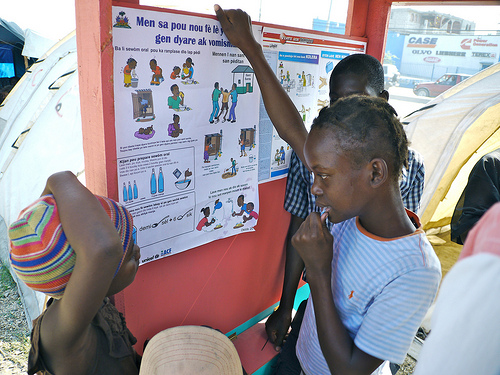The United Nations, blamed for causing the outbreak of cholera in Haiti which killed over 7000 and sickened over half a million, has rejected a November 2011 claim for compensation on behalf of victims of the disease, stating, “claims are not receivable.”
“Today, the United Nations advised the claimants’ representatives that the claims are not receivable pursuant to Section 29 of the Convention on the Privileges and Immunities of the United Nations,” a spokesperson for U.N. Secretary-General Ban Ki-moon stated on Thursday. “The Secretary-General telephoned Haitian President Michel Martelly to inform him of the decision, and to reiterate the commitment of the United Nations to the elimination of cholera in Haiti.”
There is a mountain of evidence showing cholera was brought to Haiti by U.N. forces, as Mark Weisbrot, co-director of the Center for Economic and Policy Research and president of Just Foreign Policy has pointed out, and former President Bill Clinton, U.N. special envoy for Haiti, has stated that cholera was brought by UN forces as well.
Weisbrot slammed today’s decision as a failure by the U.N., the U.S. and its allies:
The scientific and forensic evidence that UN troops brought cholera to Haiti is far beyond the standard of “reasonable doubt” required in the U.S. criminal justice system, let alone the less exacting standard of “preponderance of the evidence” in a civil suit. It included studies by independent scientists, articles published by the New England Journal of Medicine, the U.S. Center for Disease Control, and even the UN’s own research.
If this were a private corporation that could be sued in a U.S. court, there is little doubt that it would end up paying hundreds of millions if not billions in damages. The UN’s denial represents a failure not only of the UN system, which is abused by the rich countries, but a failure by the U.S. and its allies, who sent those troops to Haiti without proper safeguards and against the will of the Haitian people.
The U.N. statement added that it has “worked closely with the people and government of Haiti to provide treatment, improve water and sanitation facilities, and strengthen prevention and early warning. In December 2012, the Secretary-General launched an initiative for the Elimination of Cholera in Haiti, which aims to strengthen Haiti’s own National Cholera Elimination Plan through significant investments and the use of an oral cholera vaccine.”
Weisbrot has previously said that the U.N.’s cholera elimination plan “falls short,” and said “It is unclear where the money for this is going to come from, and whether the international community, which has chronically underfunded responses to disasters in Haiti, will treat this any differently, and actually put up the cash to stop needless deaths.”
Weisbrot stated today that they do “have the resources to put an end to cholera in Haiti for less money than they are going to spend in the next year or two on keeping U.N. troops there. But they’re in no rush to right the wrongs that they have done.”
Andrea Germanos is a staff writer with Common Dreams, where this article first appeared.



